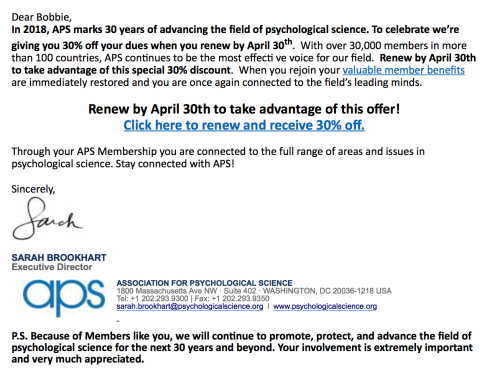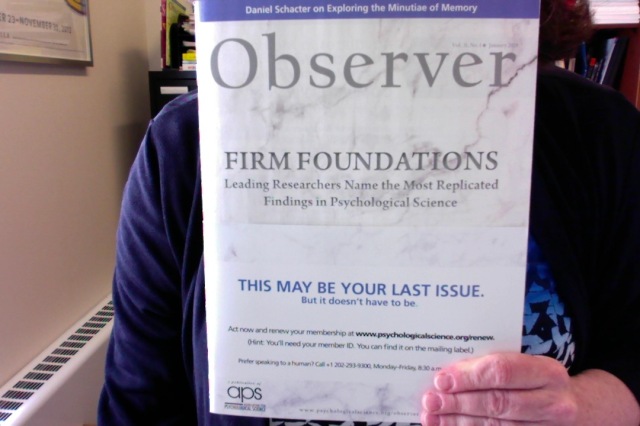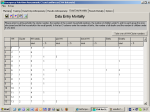APS is celebrating its 30th annual convention in a few days. I promised to write before then about the things I want to see happen at APS that would get me to rejoin the organization that I was involved in, and loved, for many years.
I finally recognized that my gripes have a common theme: At 30, APS needs to realize that it has grown up. It started as a small group that believed APA was not representing the interests of psychological science (as opposed to psychological practice). Early on, everyone knew each other. And perhaps everyone had common goals.
But you can’t run an organization of 35,000 people, who are now much more diverse in geography, age, field, and other demographics and interests, the same way you run an organization of 400. APS is no longer the “upstart”; it has gained visibility and power, and needs to act accordingly.
So, below are my three categories of things that need(ed) changing:
- I wanted Sternberg gone as Editor of Perspectives. You may have heard that one before; and it was accomplished; so, I’m putting that at the end of this post (to be skipped if sated).
- Openness. I’ve mentioned that I want elections to provide more information about the candidates. They are supposed to be our representatives, so they should have the space to make claims about what they are representing. But, that is not the only type of openness I’m suggesting.
- Not following bylaws. No one reads the bylaws of organizations any more. Except maybe people who were on the board and happened to be lawyers. Like me. APS disregards many of its own bylaws in the way that a closely held corporation might; the kind of small organization run by a family, where everyone knows each other. And maybe that was fine way back when. But it is not a good practice any more.
2. Openness
APS states that among its guiding principles are:
- “Transparency, openness, and reproducibility are vital elements in advancing scientific knowledge.”
I don’t want to discuss here how well APS has implemented these values in its journals and conventions. (Clearly, it has done some very good things and failed at some other things.) But – what about in the governance of the organization? Not good. Some examples:
- As mentioned above, candidates for board positions do not present their views. Hence, election by popularity (of person, or area, or group affinity). Candidates should have the room to write more and to address questions posed by APS members.
- Member of committees. A few months ago, people wanted to know who was on the Publication Committee. Can’t find that on the website.
The other committees: “The standing Committees shall consist of the following: Awards, Convention, Elections, Finance, Membership, and Publications.”
You can find the fellows and awards committees for each award (when you dig down a few levels to make a nominations).
You cannot find the convention committee through the convention links, but you can if you do a search. https://www.psychologicalscience.org/2018-program-committee
I have no idea how to find the members of the Elections Committee though maybe they are mentioned when soliciting nominations or when voting occurs. (Either I never knew or don’t remember.)
Maybe it should look more like the Psychonomic Society site?
- Name the Action Editors for journal articles – at LEAST if the action editor is the Editor in Chief. (Psych Science and AMPPS do that by EIC choice.)
- And, not exactly openness but get someone to connect the pieces:
I believe that there should be a new position at APS: Psychological Science Rotator. This is could be a mid-level person with a psych Ph.D. who advises APS and helps it consider the BIG PICTURE from the view of a psychological scientist. This might include thing like reading some of the material (e.g., journal article summaries; promotional materials) before they are sent out; considering interconnections between areas within psychological science; and helping to craft reactions to public policy questions.
Right now, Andy DeSoto (Ph.D., 2015) is at APS (maybe part time shared with TheLab@DC. I’m not sure). He was a “Methodology Fellow” (2015-16) and now “Assistant Director for Policy”. Andy seems great, and those positions seem good for a junior person, but a more senior person, with a regular position, might make sense as well. Board members and committees have very limited (by time and/or content) interaction with the working of APS. I’ve suggested such a position in the past; some folks think it’s a great idea, some think it’s not necessary to have anyone at APS with advanced psychology degrees.
3. Follow Your Own Rules – or change them.
The APS by-laws say the following:
“Periodically, but at intervals no greater than every five years, the Board of Directors shall appoint a special committee to review the then-current Bylaws and the operation and structure of the Association and to make recommendations about them to the Board.”
Has that ever happened? I’m wondering because the rules prescribe term limits on various board positions, committee members, and committee chair terms, and I’m certain that some of those limits (maybe most, maybe all) have been violated. For example, the previous chair of the publication committee served for a very long time. (And did mostly a very good job. But – the closed corporation/family at work.)
Another example: Here you can see the Board of Directors. https://www.psychologicalscience.org/about/board-of-directors
Members vote for the president and for the members-at-large. What about the treasurer and secretary? As in many organization, those are appointed.
“The Board of Directors shall annually appoint a Secretary and a Treasurer who need not be Members-at-Large and who shall serve as ex-officio members of the Board without voting privileges unless they are Members-at-Large… The Secretary is eligible for reappointment up to three years and the Treasurer is eligible for reappointment up to six years.”
The current Treasurer, Roberta Klatzky, has served since at least 2000. I like her a lot; as far as I can tell she does a good job. And it is certainly useful for a Treasurer to hold the position for a while. But… 18 years?
The current Secretary has served since 2011. The Secretary has no real responsibilities (because APS staff does what a secretary might do) and no vote. A long time ago, the President appointed junior faculty as Secretary to have a younger perspective in the room. Mahzarin Banaji was a secretary; I was a secretary (and for more than 3 years). In more recent years, the picks were to add older wise voices (e.g., past president Linda Bartoshuk, then Anne Triesman) and then to add geographic diversity because Europeans were not winning Board seats (Gun Semin). But now there is geographic diversity on the Board and, even if not, certainly no reason to keep the same person in that position for 7 years.
So those are my more technical gripes about how APS should be conducting itself as it hits 30. Then there was my less technical one. (Feel free to skip.)
– – – – – – – – – – – – – – – – – – – – –
1. Back to Sternberg…
The first thing I wanted to happen at APS before I rejoin was removing Sternberg as Editor of Perspectives. That was accomplished not by APS but, rather, by Sternberg resigning because of… Well, pick your reason. But he resigned. I am sad he stayed so long and that APS took no action (or no visible action) after complaints about him were raised over a year ago. I am also sad that, at least in part because of him, a new journal was created – Advances in Methods and Practices in Psychological Science – rather than keeping that stuff part of Perspectives. I thought that Perspectives could go to more issues per year and have “sections”, like JPSP, with different editors. Shared methods – and, at least, appreciating the strengths and weaknesses of the methods we do and do not use – is something that ties our field together and helps us move forward. I would have liked to see methods integrated into a content journal to showcase its relevance to every psychologist. (This has nothing to do with choice of Dan Simons as Editor of AMPPS – I’m quite sure he knows that I am a big fan of his.)
– – – – – – – – – – – – – – – – – – – – – – –
I believe that APS has done some great things in its 30 years. Even some in the last 5. But it could certainly be doing better and I hope its members will be able to have more of a voice in how to make it so.

 If you want us to get back together, there are three things you need to do.
If you want us to get back together, there are three things you need to do.


